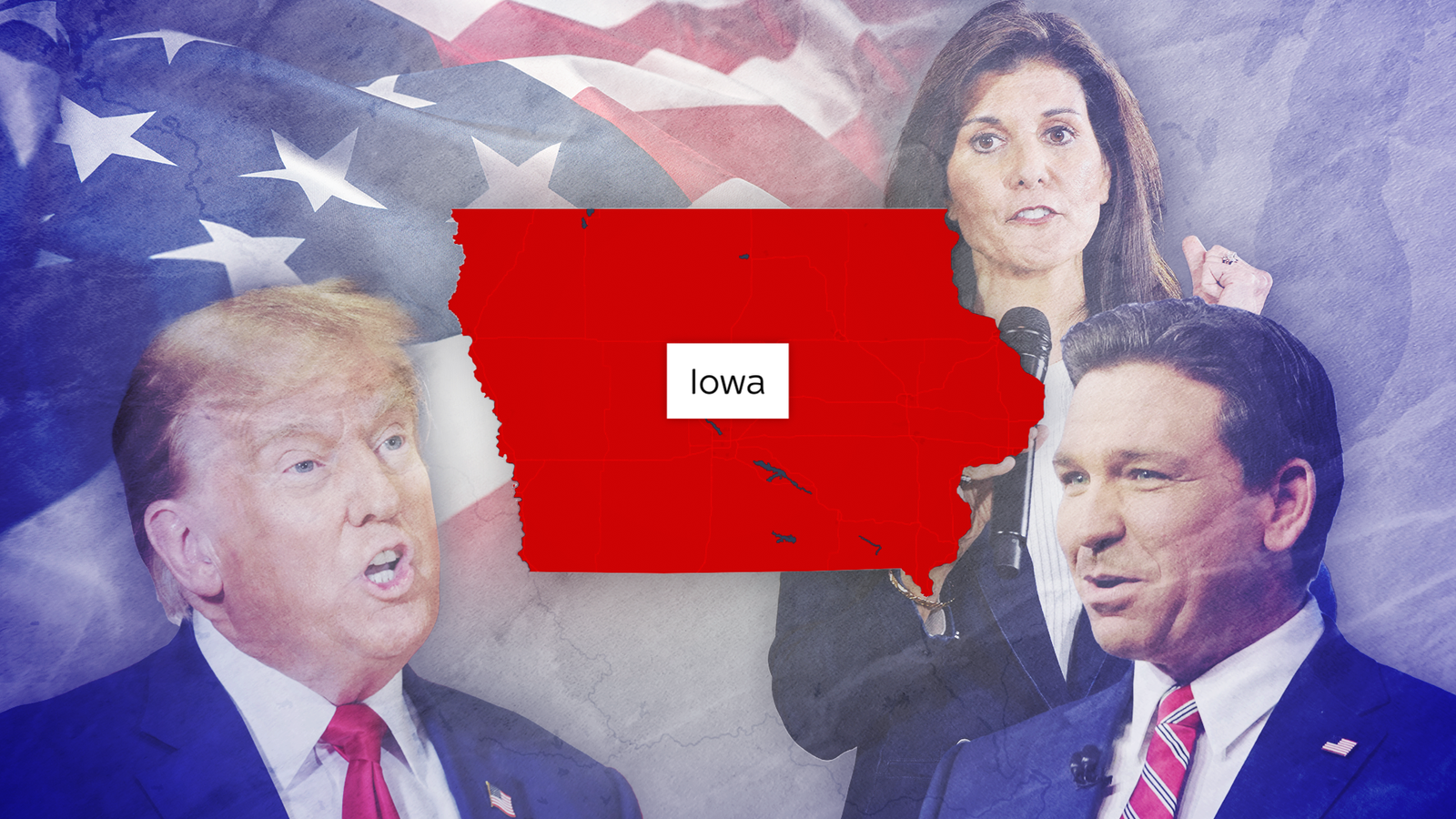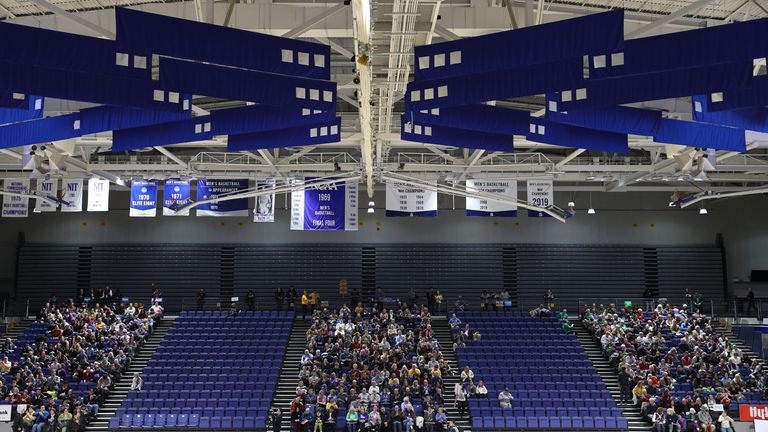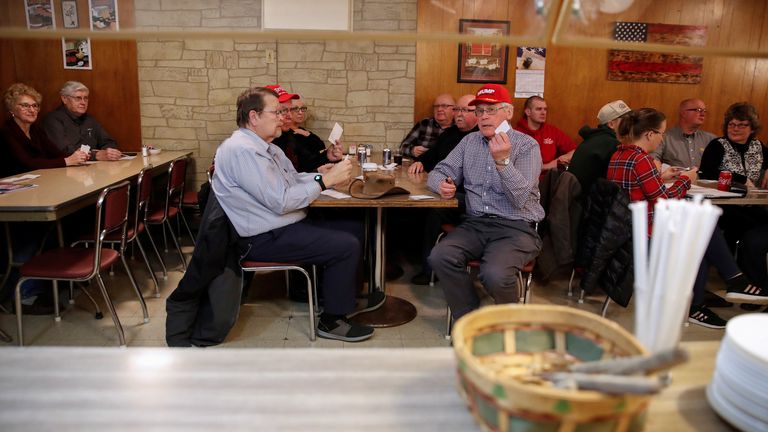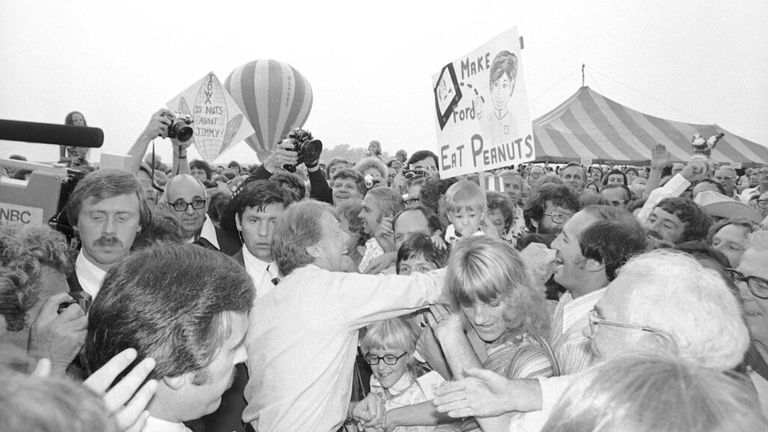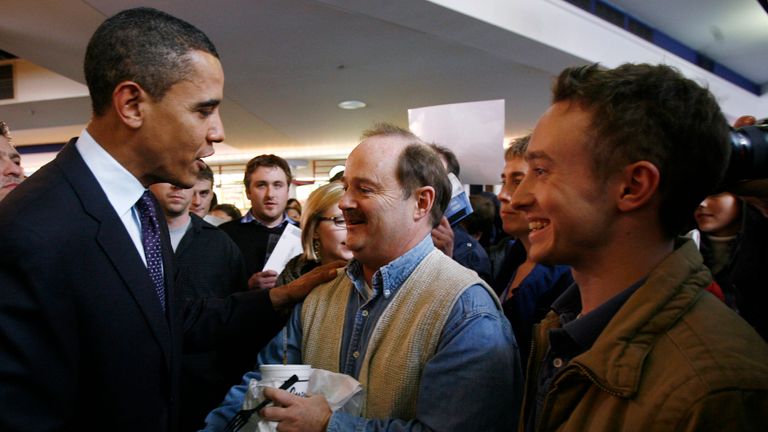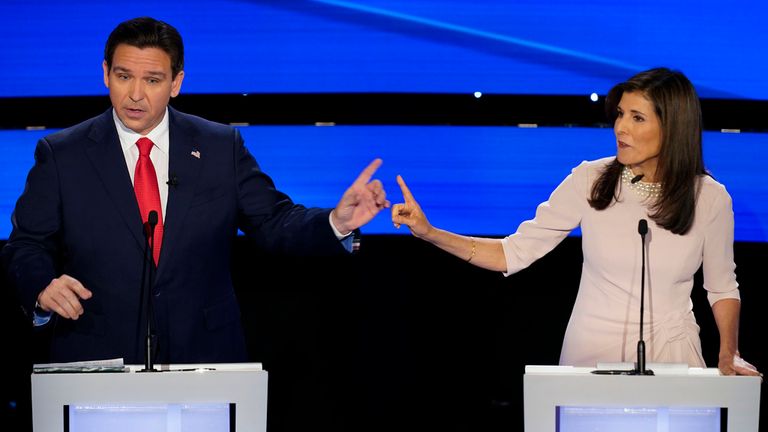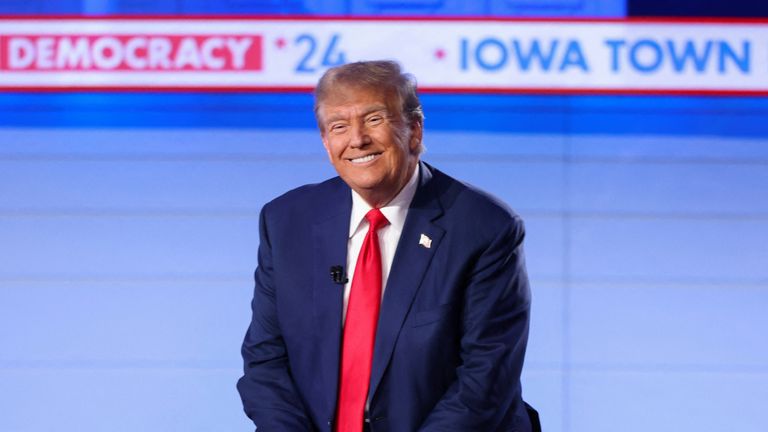It might be nine months away – but the race to the US presidential election has well and truly begun.
The first step in deciding which candidate will get their party’s nomination begins in Iowa on Monday evening.
Since 1972, the midwestern state has been the first to hold its caucus – which has routinely acted as a litmus test for how candidates will fare later along the campaign trail.
But with the Democrats not voting at their Iowa event this year – and Donald Trump’s multiple brushes with the law, this year’s proceedings may not be straightforward.
Here we look at what happens in Iowa, what a caucus is, and whether the winners will be the ones to watch.
What is a caucus – and how does it work?
The road to a US presidential election is long, beginning almost exactly a year before the incumbent is inaugurated with a star-studded ceremony at the White House.
It begins with primaries and caucuses – two ways Democrats and Republicans begin the process of nominating a candidate.
The vast majority of states hold primaries, but Iowa and some other, traditionally Republican states opt for caucuses instead.
Read more:
Who’s running to be the next US president?
All you need to know about Trump’s legal cases
Who is Republican candidate Vivek Ramaswamy
While primaries are like mini-elections, whereby party members can cast their vote at any point throughout the day, or sometimes by post, caucuses must be attended in person.
Primaries are run by the state whereas caucuses are organised by the parties themselves.
Caucuses take place at precinct, district, and state level in places such as schools, churches, and community centres.
Those who attend listen to speeches made on behalf of each potential candidate by their campaign representatives. Caucus-goers then vote for their preferred candidate and these are tallied in a matter of hours.
Primaries and caucuses can be open or closed, with the former allowing anyone to take part and the latter restricted to party-registered voters.
The outcome of the caucus or primary determines how many delegates each candidate gets to represent them at the party’s national convention in the summer.
At the convention, the candidate with the most delegates becomes the presidential nominee, but if there is no clear winner at primary or caucus level, the delegates vote again at the convention.
Why does Iowa go first?
Iowa has long been a traditionally Republican state, with its current governor, House representatives and senators all belonging to the GOP.
But from the 1950s, Democrats have had more of a presence there.
With the increasing influence of trade unions came calls for the state’s cities to get better political representation, more in line with rural areas.
Then after the Democratic National Convention of 1968, where protests over the Vietnam War resulted in a protester’s death and hundreds of injuries, Democrats in Iowa demanded reform of the state caucus system – to move power away from party bosses and more into the hands of grassroots activists.
This saw separate conventions created at state and district level, which elongated the caucus process and meant the whole thing had to start earlier.
As such, since 1972 Iowa has been what is commonly referred to as “first in the nation”.
Why has it become so important?
Iowa’s “first in the nation” status means it often acts as an initial performance indicator for nominee candidates.
“The results in Iowa sends a signal to the rest of the country on the tenor of each of the candidates and whether they really will have the chance of proceeding on,” Jim McCormick, emeritus professor of American politics and US foreign policy at Iowa State University, tells Sky News.
This was capitalised on in its first year, when South Dakota’s senator George McGovern realised Iowa would be first and made a particular effort there – with him going on to win the nomination for the Democrats.
Ahead of the next election in 1976, Jimmy Carter’s campaign team honed in on Iowa, which gained nationwide media coverage and ultimately helped propel him to the White House.
From then on, every US president since Carter, aside from Bill Clinton in 1992 and Joe Biden in 2020, has finished within the top three of the Iowa caucus.
Barack Obama often credits his win there with his election to the presidency in 2008.
But historically, coming first in the caucus has not guaranteed winning the party nomination, particularly among Republicans.
As such, there have only been three times when the winner of the Iowa caucus has gone on to win the Republican nomination.
Iowa has proportionately more white and elderly people than many other states, so despite efforts made by campaign teams, the result there can still turn out to be misleading.
Poor weather in January and the timing of the event can also lead to low turnout, with only 30% of registered Republicans taking part in 2016, the last time the race was competitive.
But Prof McCormick argues: “International observers have a tendency to look to New York, Washington DC, and Los Angeles to see what the US is all about.
“But Iowa is so-called ‘flyover country’, which is more reflective of the values of middle America. So even with its demography and relatively small ethnic minorities, the message that comes out of Iowa is consequential.”
To that effect, the Iowa caucus has consistently succeeded in getting weaker candidates who perform badly to pull out of the overall race.
What’s happening this year?
Although both parties are holding their Iowa caucuses on Monday, only the Republican one is important this year.
In 2020, the Iowa Democratic caucus was plagued with technical issues, mainly around a new app, and failed to produce a clear winner.
The result had to be recanvassed and the series of blunders resulted in the resignation of state party chairman Troy Price.
Consequently, this year’s Democratic caucus will not include a nominee ballot. This will happen via a postal vote beginning on 12 January and ending on 5 March instead.
Joe Biden is largely seen as uncontested, being so far ahead of the other major candidates, Dean Phillips and Marianne Williamson, in the polls.
But Republicans will be voting on their preferred candidate at 7pm, with only registered party members and those aged 18 or over come election day allowed to take part at one of 1,700 local precincts.
As has been the case since the 1980s, the ballot will be carried out in secret.
Conditions are expected to be -19C (-2F) in the state on Monday, likely preventing many of its 600,000 registered Republicans from getting to the event, particularly those in rural areas.
Who’s in the running and what about Trump?
Despite multiple ongoing legal fights, Donald Trump is still dominating the polls.
While Ron DeSantis was long tipped to be his main competitor, former UN ambassador Nikki Haley has now surpassed the Florida governor in polling.
According to Prof McCormick, Mr Trump’s performance in Iowa is likely to determine whether either of the other two stand a chance of beating him to the nomination stage.
“Given that Trump has a very large lead, this is going to be an important signal to other states about whether there really is a chance of forestalling his getting the nomination,” he says.
While Ms Haley appears to have outperformed Mr DeSantis in the Iowa debates, her success in the caucus will depend on how well-organised her campaign team has been across the state, he adds.
“She’s been very well organised in New Hampshire (the next primary after Iowa), but in Iowa she’s been concentrating on people in the suburbs, because they are the people who will be able to get to the caucuses.
“DeSantis keeps saying he’s visited all 99 counties in Iowa – so he’s booking everything on it.
“But a lot of his support will come from rural counties, evangelical Christians, and older voters, who may not be able to get to the caucus sites in -26C.”
Mr DeSantis has also suffered from high staff turnover in his campaign team, weaker debate performances than Ms Haley, and having some views that are similar to Mr Trump’s, Prof McCormick adds.
These factors combined mean there is a greater risk of a poor result and him being forced to bow out.
Mr Trump, by contrast, skipped the debates, and took part in a Fox News town hall event instead.
As well as the economy, issues caucus-goers will be focused on include state laws recently passed on transgender and abortion rights, along with agricultural exports.
So is this year’s Iowa caucus really ‘one to watch’?
The short answer is yes.
Prof McCormick stresses: “If Trump comes out with a very large lead in Iowa, that should be taken as a very good indicator he’ll get the nomination.
“But if Trump doesn’t get at least 50% of the vote – and either Haley or DeSantis come up close, even within a 10-point margin, that really raises a question about his ‘slam dunk’ ability to dominate the process – and we could be looking at a different story.”
But beyond the nomination, Trump’s future is still uncertain, he adds.
“The Biden campaign has indicated they’ll be focused on Trump’s persona rather than a lot of the national issues. So he’ll be handicapped even if he gets the nomination.”
Click to subscribe to the Sky News Daily wherever you get your podcasts
While efforts by states such as Georgia and Maine to bar him from running are considered likely to be struck out by the Supreme Court, it is still unclear whether the lawsuits against him would prevent him from returning to the White House.
But if an Iowa win does see him secure the nomination, his supporter base is still very large, which means Monday’s caucus could end up having consequences far beyond the US.
Prof McCormick says: “Every time he’s been indicted, his popularity has gone up.
“So if Trump succeeds in getting voter turnout in Iowa that suggests we could see a foreign policy at odds with what Biden has been pursuing, which, given his attitudes towards NATO, Ukraine, and Russia, would be a huge concern for a lot of people.”
